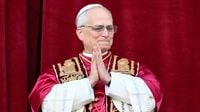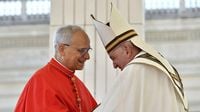On May 8, 2025, Cardinal Robert Francis Prevost made history by being elected as Pope Leo XIV, becoming the first U.S.-born Roman Catholic pontiff. This unexpected turn of events has not only captured the attention of the faithful but also raised eyebrows in the world of prediction markets, where traders had given him a mere 1.2% chance of being selected.
Prevost, who previously served as the prefect of the Dicastery for Bishops at the Vatican, chose the name Leo XIV upon his election. The announcement was made from the balcony of St. Peter's Basilica, marking a significant moment for the Catholic Church and its followers worldwide.
The election of Pope Leo XIV has sparked discussions about the accuracy of prediction markets in forecasting papal elections. Many had credited these markets with their ability to predict outcomes in various political arenas, including the last U.S. presidential election. However, this time, the crypto betting platform Polymarket was far off the mark, as they had not considered Prevost a frontrunner.
In the lead-up to the conclave, the betting landscape had been filled with speculation. The last papal conclave in 2013 saw Cardinal Jorge Mario Bergoglio of Argentina emerge as a surprise winner, despite being a 25-to-1 long shot. At that time, Cardinal Angelo Scola was the favorite at 2-to-1, while Peter Turkson from Ghana had 5-to-2 odds. The unpredictability of papal elections continues to intrigue both the faithful and those who engage in the betting markets.
Alessandro Allara, a former marketing executive turned podcaster, shared his experience betting on the papacy. He placed about $170 at 8-to-1 odds on Cardinal Matteo Zuppi, believing that it was time for Italy to have another pope. Allara remarked, "It’s been a long time since we’ve had an Italian pope, and Zuppi would be a more rock-and-roll type of pope." His enthusiasm reflects the growing interest in papal betting, a phenomenon that has evolved over centuries.
Unlike traditional sportsbooks, which do not permit betting on religious figures or events, prediction markets have gained traction in recent years. Kalshi, a federally regulated platform in the United States, allows users to trade contracts on various events, including who will become the next pope. As of May 7, 2025, over $29 million had been traded on papal-related contracts across Kalshi and Polymarket.
In the current conclave, 135 cardinals under the age of 80 were eligible to vote, although two dropped out due to health reasons. Of those, 108 were elevated to cardinal by Pope Francis, the former pontiff. To secure the papacy, a single cardinal must obtain the support of two-thirds of the voting cardinals, which equates to 89 votes. This process highlights the significance of the conclave as not just a political maneuver but a deeply spiritual event.
Father James Martin, a Jesuit priest and author, emphasized the spiritual nature of the conclave. He stated, "It’s not about winning. It really shouldn’t be about who wins, who loses, who’s up, who’s down. That’s not really what the conclave is about." This sentiment underscores the contrast between the sacred tradition of the conclave and the modern phenomenon of betting on its outcomes.
Historically, betting on papal elections dates back at least 500 years, with evidence suggesting it began in the 14th or 15th century. Nicholas Baker, a historian of Renaissance Italian history, noted that the practice became well-established by the 16th century. Bettors at that time often relied on inside information from newsletters and diplomatic dispatches to inform their wagers.
Despite attempts to regulate and ban papal betting, interest persisted. In 1591, Pope Gregory XIV prohibited the practice under threat of excommunication, but enforcement was inconsistent. By the time of Pope John Paul II's death in 2005, modern sportsbooks had embraced the trend, leading to a significant increase in betting activity.
As the papal election approached, prediction markets became a focal point for those looking to speculate on the outcome. Kalshi and Polymarket reported a combined trading volume that surpassed $29 million, reflecting the growing fascination with the papacy and its electoral process.
Jack Such, a spokesman for Kalshi, remarked on the unique nature of papal markets, stating, "With low-information events like papal elections, prediction markets are uniquely well-positioned to bring out important signals and trends." This insight highlights the intersection of finance and faith, where the opaque nature of the conclave invites speculation and engagement from a diverse audience.
As the world reflects on the election of Pope Leo XIV, the implications extend beyond the walls of the Vatican. The convergence of tradition and modernity through betting markets illustrates a changing landscape in how people engage with religious events. Whether viewed as a sacred ritual or a betting opportunity, the papal election continues to captivate and inspire discussions about faith, leadership, and the future of the Catholic Church.
In conclusion, the unexpected election of Cardinal Robert Francis Prevost as Pope Leo XIV has sparked a renewed interest in both the papacy and the betting markets that surround it. As the Catholic Church navigates this new chapter, the intersection of faith and speculation will likely continue to evolve, inviting both reverence and curiosity from around the globe.


